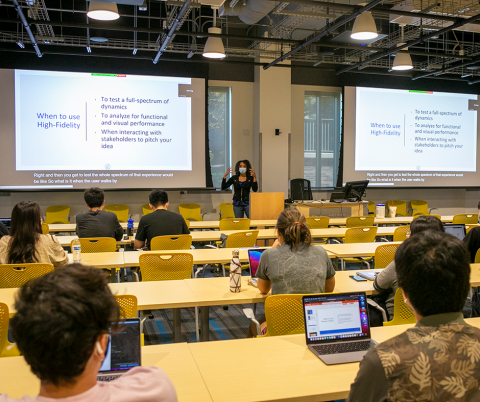Understanding Undergraduate Computing Student Perceptions of Race (2023-2024)
Computer science (CS) is overwhelmingly dominated by white and Asian, able-bodied, middle- to upper-class cisgender men. Effects of this lack of diversity are evident in academic and workplace cultures and biased, harmful technologies that negatively impact nondominant identities (e.g., facial recognition, predictive policing, healthcare and financial software). In CS, this racial “othering” is apparent through not only biased technologies but also courses, departments and organizational cultures.
While numerous efforts to broaden the participation of Black, Indigenous, Native Hawaiian/Pacific Islander and Hispanic/Latinx students in computing exist, these programs fail to address the systemic inequities that students face from educators, peers and academic cultures. They also fail to capture how students (especially those from the dominant white and Asian identities) perceive the impacts of race, racism and white supremacy on their academic experiences and others’.
Building on the work of the 2022-2023 project team to collect quantitative and qualitative survey data, this project team conducted phenomenographic, thematic and content analysis to address the following research questions:
- How do CS undergraduate students perceive race in university computing departments?
- What factors influence CS undergraduate students' understanding of and experiences with race in the context of computing departments?
The project team determined that computing students’ experiences discussing race before college were related to their attitudes toward race and privilege in computing spaces, both within the academy and in professional computing environments. Further analyses of the interview data revealed that computing students who did not spend their formative years in the United States had vastly different conversations about race before coming to college and, similarly, had very different perspectives on race and racial bias in computing than did U.S.-based students.
Learn more about this team’s work by reading their team profile.
Timing
Fall 2023 – Spring 2024
Team Outputs
Let's Talk About It: Computing Students' Conversations and Views About Race (Team profile; 2024 Fortin Foundation Bass Connections Virtual Showcase)
The Role of Student Backgrounds in Understanding Racial Disparities in Computing (Research poster; 2024 Fortin Foundation Bass Connections Showcase)
Presentation. Annual Meeting of the American Sociological Association. Montreal, Canada. August 2024.
Fatima Glovena Fairfax, Jabari Kwesi, Elyse McFalls, Reagan Lenora Razon, Alexandra Thursland, Crystal E. Peoples, Shaundra Bryant Daily, Alicia Nicki Washington, Eduardo Bonilla-Silva, Brean Elizabeth Prefontaine. The Role of Student Backgrounds in Understanding Racial Disparities in Computing. June 25, 2024. Portland, Oregon. ASEE Annual Conference.
See related teams, Understanding Perceptions of Race Among Computer Science Undergraduates (2024-2025) Understanding Perceptions of Race Among Computer Science Undergraduates (2022-2023).
Image: Professor Shaundra Daily teaches Human-Centered Computing in the Duke Engineering Wilkinson Building, by Jared Lazarus/Duke University

Team Leaders
- Eduardo Bonilla-Silva, Arts & Sciences-Sociology
- Shaundra Daily, Pratt School of Engineering-Electrical & Computer Engineering
- Crystal Peoples, Arts & Sciences-Computer Science
- Nicki Washington, Arts & Sciences-Computer Science
/graduate Team Members
-
Fatima Fairfax, Sociology-PHD
-
Jabari Kwesi, Computer Science-PHD
-
Alexander Rogers, Sociology-PHD
/undergraduate Team Members
-
Elyse McFalls, Statistical Science (BS)
-
Reagan Razon, Computer Science (BS)
-
Alexandra Thursland, Computer Science (BS)
